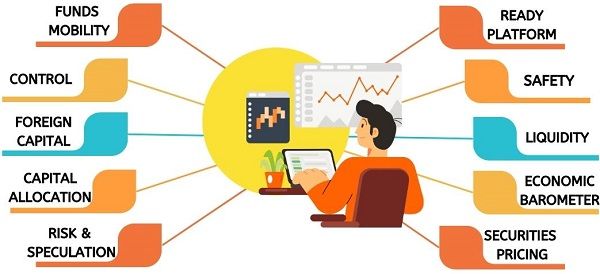The Functions of the Stock Exchange are not restricted to just trading but are a most extensive part of the economy. Therefore, it performs many functions which are crucial for Investors, Firms and the Economy as a whole.
Read through this post to learn the various functions of the stock exchange in detail.
But first, let’s understand the meaning of the Stock Exchange.
Stock Exchange Introduction
Like any other marketplace, the stock exchange is a platform for businesses to trade their stocks and shares. It is a public market that operates in both physical and online forms.

The securities previously issued in the primary market are traded on the stock exchange. For this reason, it is alternatively known as Secondary Market.
It is a clearly defined mechanism containing a set of structured rules and regulations. In addition, it significantly affects people’s wealth and firms’ investment decisions.
Here, stocks include shares of stocks, bonds and financial institutions. And the one who buys or invests in these stocks becomes the firm’s partial owner.
In the secondary market, the stock prices depend on demand and supply. However, the risk profile keeps on changing dramatically.
Content: Functions of the Stock Exchange
- Functions of the Stock Exchange
- Stock Exchange Holiday
- List of Stock Exchanges
- Virtual Stock Exchange
- Bottom Line
Functions of Stock Exchange
As mentioned earlier, the essential Function of the Stock Exchange is to aid cost-effective trading. Besides, it promotes Risk Trading and Boosts Liquidity.
Similarly, it performs many essential functions listed below:

1. Ready Platform
The firms and the public get a systematic and safe platform for trading. Here, the investors and firms must abide by the pre-set rules and regulations.
2. Safety
Only the listed companies can trade on the exchange. Through listing, each company get verified, thereby eliminating the possibility of fraud. Thus, it provides safety to transactions and investors.
3. Liquidity
It is one of the most essential functions of the stock exchange. Liquidity implies the conversion of securities into cash as and when required. Investors who seek liquidity trade on the stock market. Therefore, exchange assures the liquidity from the firm while listing.
4. Economic Barometer
In the stock market, the prices of the shares keep changing. The overall price change and its movement on the graph represent country’s economic condition.
5. Securities Pricing
Price is a vital element in all kinds of trade. So, another function is the pricing of securities. It is determined based on Demand and Supply.
6. Risk Trading & Speculation
Risk trading and Healthy Speculation are important for profitable trading. Stock markets give the scope for risk trading and speculation. However, it keeps a check on them to restrict unfair practices.
7. Wise Capital Allocation
Generally, the firms whose shares perform well are usually traded at higher prices. Moreover, every investor wants to invest in profitable shares. Therefore, firms get the opportunity to generate fresh capital.
8. Attract Foreign Capital
The potential of stock markets that generates profits attracts foreign investors too. Foreign investments allow developing countries to grow technically and economically.
9. Control
Stock Exchange’s essential function is controlling trading activities. In the absence of control, unfair practices might increase, which can hamper investors and firms.
10. Funds Mobility
As a platform of trade, the stock market motivates and attracts investors to invest in stocks. This way, the people try to save more and invest it in securities. Consequently, the money starts getting mobilized in the economy.
Stock Exchange Holiday
It is the day when a particular stock exchange remains closed. In this while, the trading is disallowed. It means one can’t use his D-MAT account either online or offline.
Such holidays are necessary to ensure the smooth functioning of the exchange. However, investors get benefitted from it as they can book profits. This is because, stock prices don’t fluctuate during a holiday.
Besides trading, clearance is also restricted on a stock holiday.
List of Stock Exchanges
At present, the US stock market is the largest in the world. It is still a potential and vital market for the world. NASDAQ and Shanghai Stock Exchange occupy the second and third positions on the list.
Listed below are the ten largest stock exchanges in the world based on market capitalization:
- New York Stock Exchange (NYSE), US
- NASDAQ, US
- Shanghai Stock Exchange (SSE), China
- EURONEXT, Europe
- Japan Stock Exchange (JPX)
- Shenzhen Stock Exchange (SZSE), China
- Honk Kong Stock Exchange (SEHK)
- National Stock Exchange (NSE), India
- LSE Group, UK and Italy
- Saudi Stock Exchange, Saudi Arabia
Virtual Stock Exchange
It is just the virtual form of the actual stock market. It is similar to the exchange wherein one can buy and sell stocks, but virtually. The platform where this virtual trade occurs is known as Stock Simulator.
In simple words, it is an online simulation of the stock market.
Since everything is virtual, so there is no money involved. However, investors make use of virtual money for trading. When the investor registers in the simulator, they get virtual money for trading.
Basically, it is designed for beginners in this field. It assists in learning how the stock market works. Also, it tests the new investor’s trading strategies and gives tips for improvement.
Bottom Line
To sum up, a stock exchange performs various functions to aid stock trading. Besides the above functions, it provides transparency in pricing and operations. Therefore, building a healthy environment for capital generation and investment.
Leave a Reply